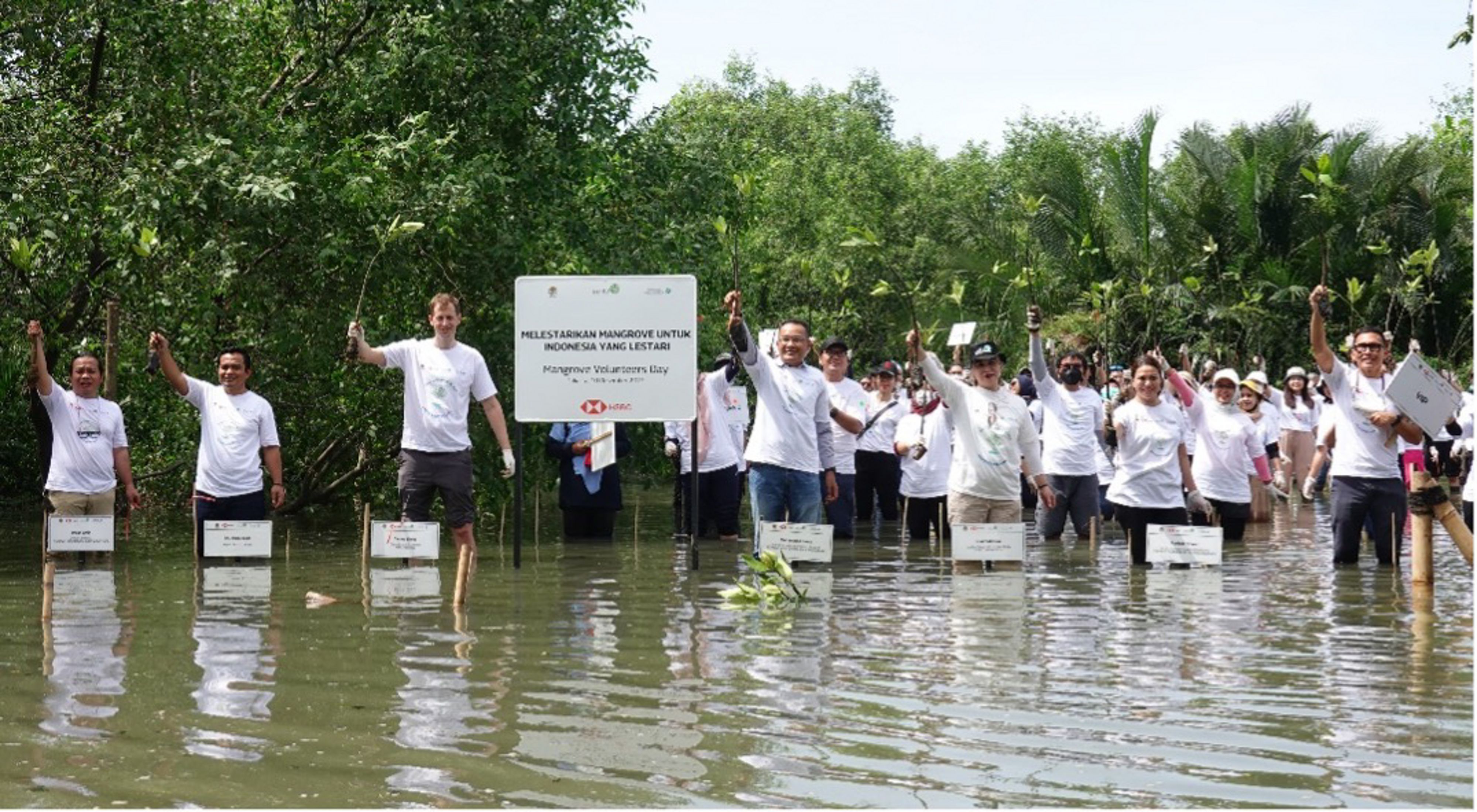Media Contacts
-
Maria Adityasari
Communication Specialist YKAN
Yayasan Konservasi Alam Nusantara (YKAN)
Email: maria.adityasari@ykan.or.id
Mangroves are the last stronghold of the coastal area; even though they are in an urban area, urban residents still have a stake in protecting the mangrove ecosystem. To increase shared awareness about mangrove conservation, the Jakarta BKSDA, together with the Nusantara Natural Conservation Foundation (YKAN) and HSBC Indonesia, held an awareness event with the theme "Conserving Mangroves for a Sustainable Indonesia," which was attended by HSBC Indonesia employees and management, on 10 December 2022 at Muara Angke Wildlife Sanctuary, North Jakarta. On this occasion, interactive discussions were held, planting mangroves, clearing weeds, mangrove nurseries, and announcing the winners of the "Mangrove Photography Competition 2022."

The Muara Angke Wildlife Reserve (SM) area in North Jakarta, with an area of 25.02 hectares, is the smallest wildlife reserve in Indonesia, an important area as life support for the city of Jakarta. "For the people of DKI Jakarta and its surroundings, Muara Angke Forest Reserve is home to 8 true mangrove species, namely Avicennia marina, Bruguiera gymnorrhiza, Nypa fruticans, Rhizophora apiculata, Rhizophora mucronata, Sonneratia caseolaris, Acrosticum aureum and Excoecaria agallocha. Mangroves play a role as an O2 contributor, CO2 absorber, hydrological regulator, pollutant absorber, landscape beauty, and provider of biodiversity," explained the Head of the Jakarta BKSDA Abdul Kodir, the manager of the Muara Angke SM area. Abdul Kodir added that the Muara Angke SM area is also one of the remaining mangrove ecosystems in Jakarta and a habitat for various fauna such as saltwater crocodiles, lizards, long-tailed monkeys, snakes, and is an important area for birds in Java.
Integrated management and restoration of mangroves are crucial and need the support of all parties, including the private sector. In this regard, HSBC Indonesia 2021 joined the Mangrove Ecosystem Restoration Alliance (MERA) partnership to support the strengthening of the function of mangrove ecosystems in Indonesia, particularly in Muara Angke SM; Ogan Komering Ilir Regency, South Sumatra; and Bengkalis Regency, Riau. MERA is a multi-stakeholder national platform initiated by YKAN to reduce the vulnerability of coastal communities, protect natural resources and assets, and support climate change mitigation and adaptation efforts based on scientific studies.
Francois de Maricourt, President Director of PT Bank HSBC Indonesia, said, "In line with our commitment to supporting Indonesia in preserving nature, we are always active in protecting biodiversity, one of which is by supporting the preservation of mangrove forests, as well as the various species in them. HSBC's collaboration with YKAN through MERA to promote the function of the Muara Angke Wildlife Sanctuary as a center for environmental education and mangrove ecosystem restoration in Jakarta is part of HSBC's commitment to collaborating with the Government and communities in Indonesia. We hope this program can contribute to climate change mitigation efforts."

Indonesia has the largest mangrove ecosystem in the world, with an area of 3.36 million hectares (KLHK, 2021). This area constitutes 23% of the world's total mangroves, which can store up to a third of all carbon stored in coastal ecosystems.
"If managed effectively and sustainably, mangroves can become a source of income, provide protection and reliable food for local populations, contribute to food and social security, and ultimately, contribute to the economic development of countries where mangroves are located. Given the magnitude of the role, function, and benefits of the mangrove forest ecosystem, it is our obligation to always care for and maintain the continuity of the mangrove forest, "explained the Director of the YKAN Indonesia Ocean Program, Muhammad Ilman.

Mangrove ecosystems also have a close relationship with climate change. The existence of healthy mangroves in coastal areas can increase the resilience of coastal communities to climate change and minimize the impact of natural disasters, such as tsunamis, storms, and sea waves. Indonesia's role in efforts to mitigate global climate change is enormous, so protecting and restoring mangrove ecosystems is an important step that must be taken together immediately.
Yayasan Konservasi Alam Nusantara (YKAN) is a scientific-based non-profit organization that has been present in Indonesia since 2014. With the mission of protecting lands and waters as life support systems, we provide innovative solutions to realize the harmony of nature and humans through effective natural resource management, prioritizing a non-confrontational approach, and building a network of partnerships with all stakeholders for a sustainable Indonesia. For more information, visit ykan.or.id.


